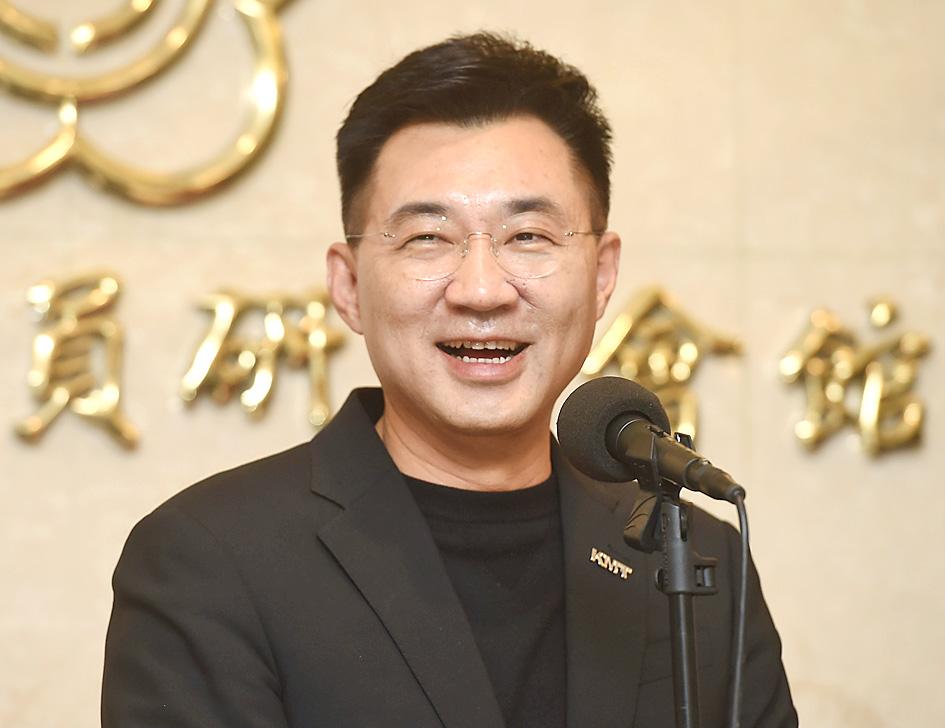Chinese Nationalist Party (KMT) Chairman Johnny Chiang (江啟臣) yesterday announced a bid to retain his post, citing the need for a “kingmaker” to choose the most suitable candidate to win the 2024 presidential election.
As party chairman, with the ability to influence policies, Chiang said that he hoped to represent the party’s younger members and change the public’s perception of the KMT from being a rigidly hierarchical party run by older politicians.
Chiang was clear about not running for president in 2024, saying that he believed the party chair should not entertain thoughts of running for president.

Photo: Chien Jung-fong, Taipei Times
However, people are free to have their own opinion, he added.
Chiang said that he stepped up, choosing to shoulder the responsibility of leading the party when it was at its lowest after last year’s presidential election, fully aware that he would face criticism for promoting change.
Over the past year, the KMT has weathered numerous issues — including the recall of former Kaohsiung mayor Han Kuo-yu (韓國瑜), re-elections for Kaohsiung mayor and city council speaker, recall motions for independent Kaohsiung city councilor Huang Chieh (黃捷) and former Democratic Progressive Party Taoyuan city councilor Wang Hao-yu (王浩宇), and protests over the importation of US pork with traces of ractopamine — but they have made the party stronger, Chiang said.
Wang was recalled as Taoyuan city councilor, while Huang remains a Kaohsiung city councilor.
The party’s long history does not mean it should be old and decrepit — it must rather change with the times, as it has done many times in the past, Chiang said, citing the reforms introduced by then-president Chiang Ching-kuo (蔣經國) in 1986.
The party must change from within as it is challenged from without, and areas such as its cross-strait policy, its policy to foster younger members, and improvements to party finances and organization all need to change, Johnny Chiang said.
The party must acclimatize itself to being in the opposition and be closer to the people, as well as familiarizing itself with technology, he added.
Younger members need to have a say in KMT policies, as the younger generation is the future of the party, he said, citing his being featured on Time magazine’s second annual “TIME100 Next” list — which recognizes “emerging leaders who are shaping the future” — as a way of encouraging younger members to step to the fore.
The KMT chairperson election is to take place in July.
Johnny Chiang defeated former Taipei mayor Hau Lung-bin (郝龍斌) in the party’s chairperson by-election on March 7 last year. The election filled the vacancy left by Wu Den-yih (吳敦義), who stepped down after the party’s losses in last year’s presidential and legislative elections.
Additional reporting by Chen Yun

Alain Robert, known as the "French Spider-Man," praised Alex Honnold as exceptionally well-prepared after the US climber completed a free solo ascent of Taipei 101 yesterday. Robert said Honnold's ascent of the 508m-tall skyscraper in just more than one-and-a-half hours without using safety ropes or equipment was a remarkable achievement. "This is my life," he said in an interview conducted in French, adding that he liked the feeling of being "on the edge of danger." The 63-year-old Frenchman climbed Taipei 101 using ropes in December 2004, taking about four hours to reach the top. On a one-to-10 scale of difficulty, Robert said Taipei 101

Taiwanese and US defense groups are collaborating to introduce deployable, semi-autonomous manufacturing systems for drones and components in a boost to the nation’s supply chain resilience. Taiwan’s G-Tech Optroelectronics Corp subsidiary GTOC and the US’ Aerkomm Inc on Friday announced an agreement with fellow US-based Firestorm Lab to adopt the latter’s xCell, a technology featuring 3D printers fitted in 6.1m container units. The systems enable aerial platforms and parts to be produced in high volumes from dispersed nodes capable of rapid redeployment, to minimize the risk of enemy strikes and to meet field requirements, they said. Firestorm chief technology officer Ian Muceus said

MORE FALL: An investigation into one of Xi’s key cronies, part of a broader ‘anti-corruption’ drive, indicates that he might have a deep distrust in the military, an expert said China’s latest military purge underscores systemic risks in its shift from collective leadership to sole rule under Chinese President Xi Jinping (習近平), and could disrupt its chain of command and military capabilities, a national security official said yesterday. If decisionmaking within the Chinese Communist Party has become “irrational” under one-man rule, the Taiwan Strait and the regional situation must be approached with extreme caution, given unforeseen risks, they added. The anonymous official made the remarks as China’s Central Military Commission Vice Chairman Zhang Youxia (張又俠) and Joint Staff Department Chief of Staff Liu Zhenli (劉振立) were reportedly being investigated for suspected “serious

American climber Alex Honnold is to attempt a free climb of Taipei 101 today at 9am, with traffic closures around the skyscraper. To accommodate the climb attempt and filming, the Taipei Department of Transportation said traffic controls would be enforced around the Taipei 101 area. If weather conditions delay the climb, the restrictions would be pushed back to tomorrow. Traffic controls would be in place today from 7am to 11am around the Taipei 101 area, the department said. Songzhi Road would be fully closed in both directions between Songlian Road and Xinyi Road Sec 5, it said, adding that bidirectional traffic controls would